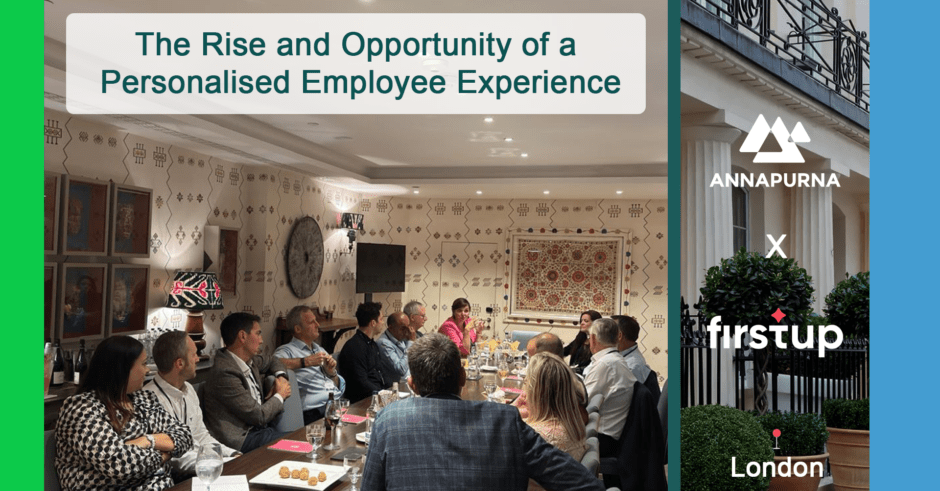The world is moving forward but are we still doing communications traditionally?
We once again partnered with Firstup, the World’s first intelligent communication platform, to bring together some of the leading HR professionals looking to take their employee communications journey to the next level.
With some of London’s brightest HR leaders being represented around the table at the Haymarket Hotel, the conversation was championing the rise and opportunity of a personalised employee experience.
Led by James Ballard (Founder at Annapurna), with expertise from Joe Marcin (Chief Revenue Officer at Firstup) and Alex McCall (Account Director at Firstup), the conversation brought about the following takeaways:
Focusing on “Moments That Matter” to drive employee satisfaction
The conversation was starting by looking at where intelligent communications tools and technologies could have the greatest impact across the employee lifecycle.
Effective communication is essential in creating memorable employee experiences, especially during pivotal moments in the employee journey. Whether it’s onboarding, career progression, or recognition, organisations need to ensure they are tailoring communication to the unique needs of individuals. Our leaders need to play a more proactive role in making sure employees feel seen and valued during these moments.
The moments that matter will be differing for generations so whilst intelligent tools can help identify patterns, true engagement comes from a leaders ability to be present and responsive to their teams’ needs at these critical junctures. An example was given whereby some managers will never use their budgets for employee engagement but could we be using technology to tell our managers that they haven’t used budgets to facilitate the moment, rather than technology creating the moment itself.
Do we even understand our employees?
Do organisations have a listening strategy? How do we listen to what our people are telling us? Are our leaders even educated enough to do that?
The role of AI was one that was always going to discussed in detail as it’s such a hot topic, however the approach was one of looking at how AI can offer new ways to enhance employee engagement.
How can we use technology like AI to help organisations “listen” better to digital body language and emotional cues from employees. ‘Digital Body Language’ became a fascinating topic of conversation, introduced by Joe Marcin to the table, as a means to understand how an employee was feeling by translating their digital footprint. We could look at whether an employee ignored/liked/commented on a company/employee post? Does an individual sit on an email for 4 days before reading? Are these cues that signal employee disengagement that could notify a manager to have a conversation or make a change?
Tools like GenAI can analyse feedback data at scale and help HR and leaders understand sentiment across diverse teams. However, AI alone cannot replicate the emotional intelligence needed to truly manage and support people. Leaders must not overly rely on tech solutions but instead use them as a supplement to meaningful human interaction.
While AI offers great potential, it’s crucial to keep the human touch alive in leadership and employee engagement.
Balancing Hyper-Personalisation and Scalability in Employee Learning Journeys
While creating personalised learning paths for employees is valuable, there’s a challenge in scaling this approach. Different generations and individuals require varying levels of personalisation, especially as organisations grow. Employee-centred design must remain the core focus, ensuring that services are simple yet adaptable.
The most significant opportunities for personalisation lie in learning and development, where individuals can choose the format, timing, and depth of their learning experiences.
We need to engaging with our employees at the right time, with the right content and on the right platform, exactly as they experience in their day-to-day life.
The employee experience is the cornerstone of everything. As HR, we want to know what everybody thinks but have relinquished all control now out to business units. We also depend on our leaders to disseminate the communications of the organisations regularly. Do we rely on this too much? Do our leaders even do it?
Technology can never replace the human, can it…?
If you’re interested in learning more about building a personalised employee experience, do reach out to Joe or Alex and give them a follow on LinkedIn for more insight.




